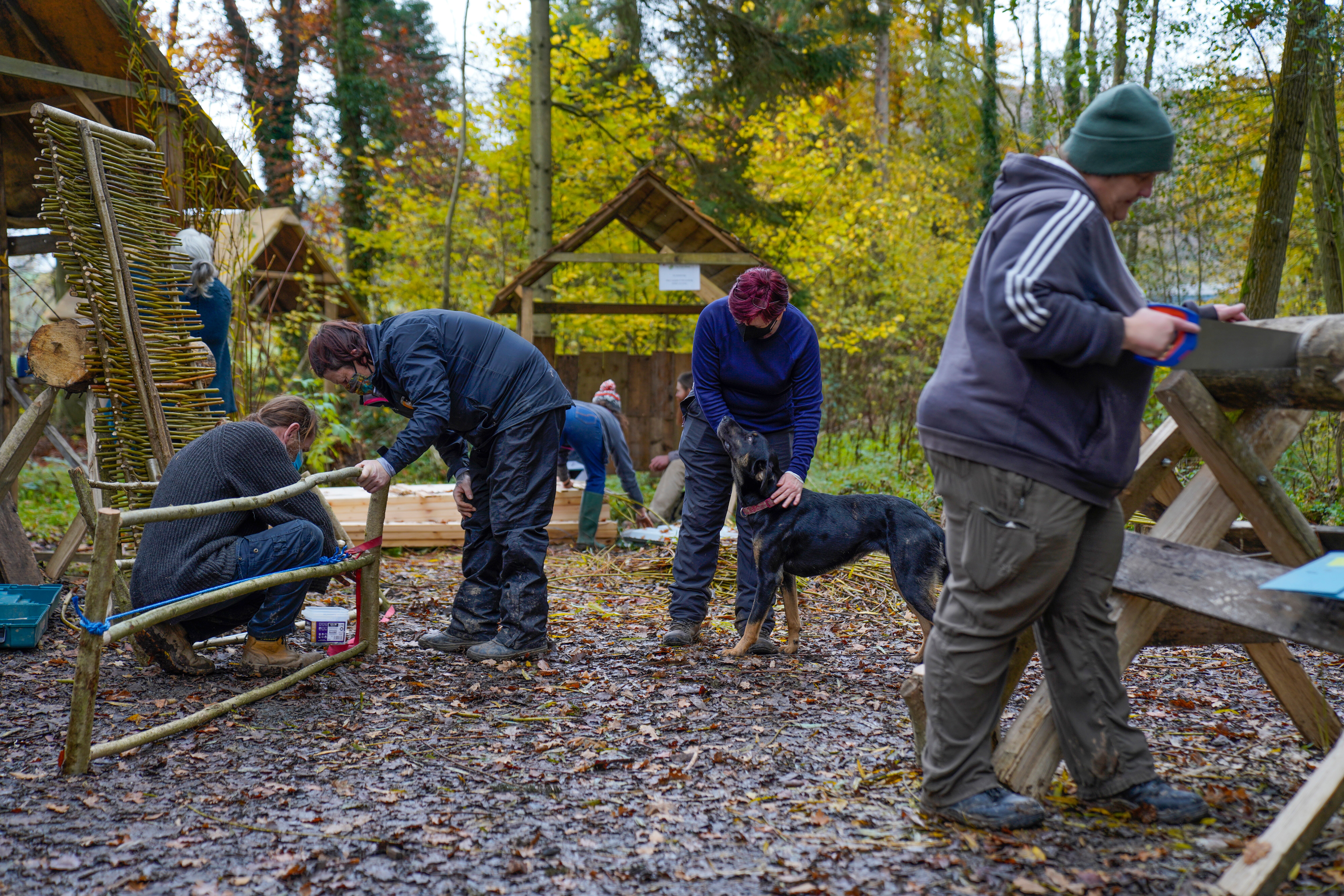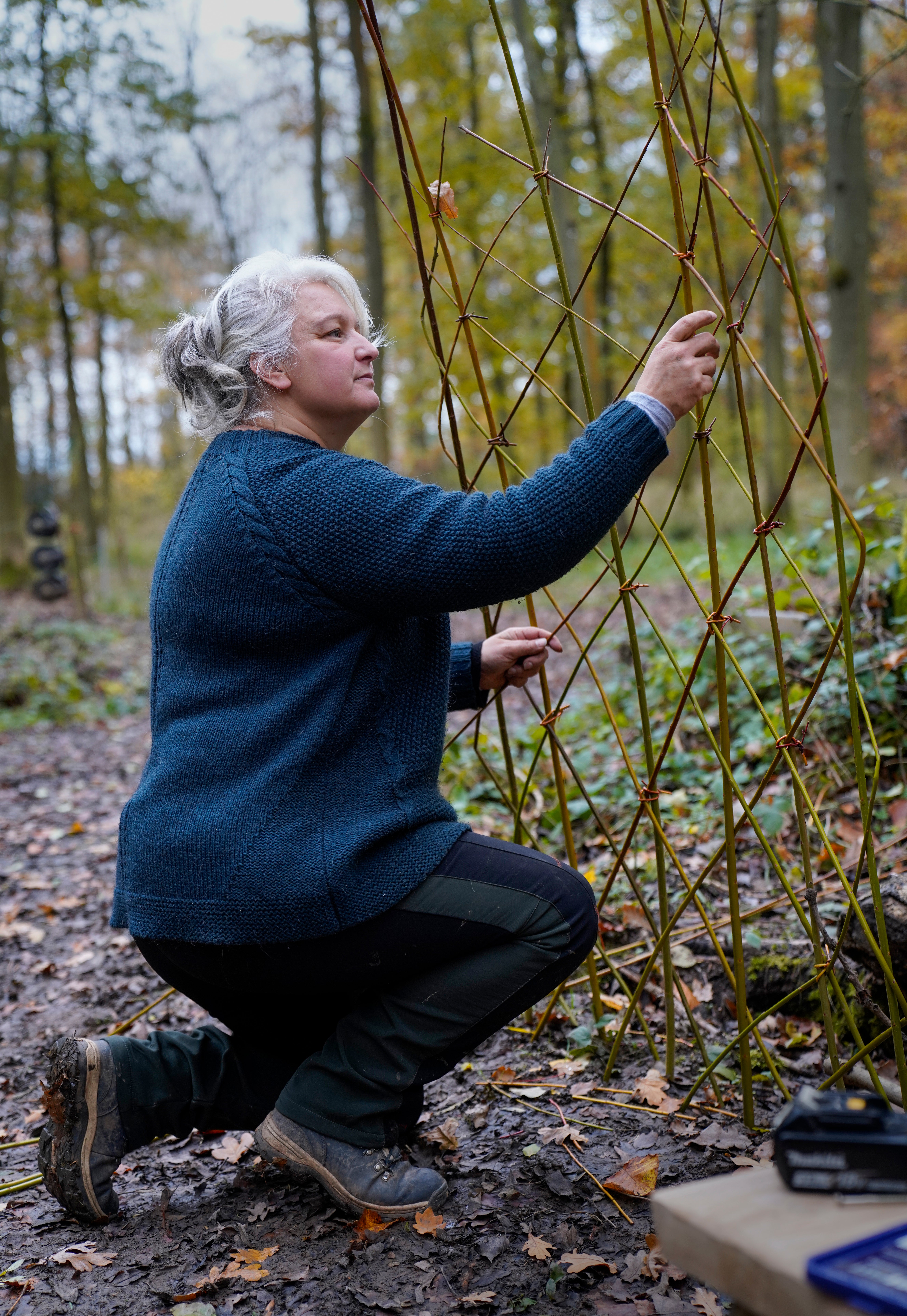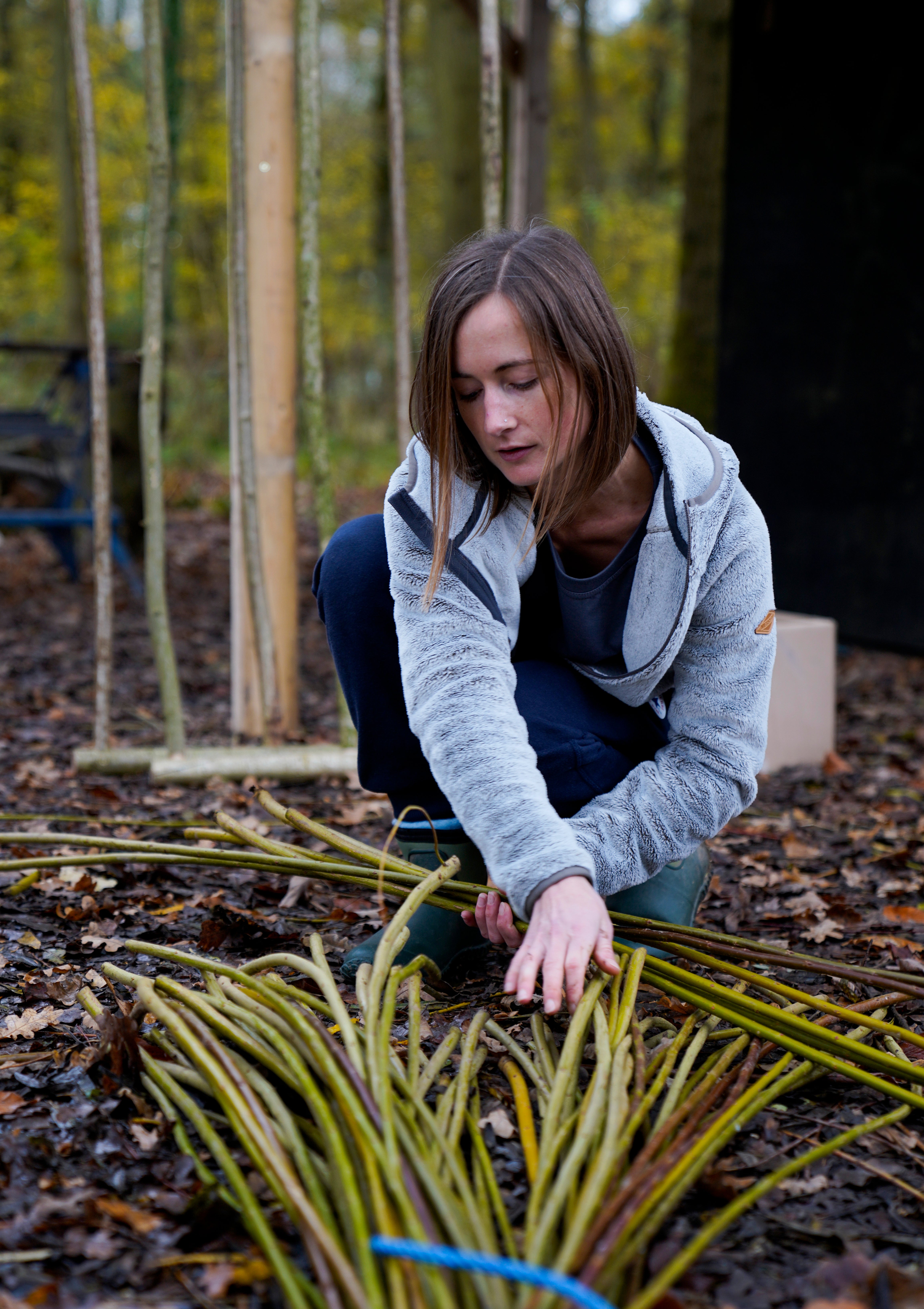The power of woodland to heal the mind and spirit
Matthew Barnett visits the Cart Shed, a charity providing a natural, outdoor space to help people with mental health problems

Tucked away in deepest North Herefordshire is a small area of woodland which is home to a remarkable social experiment that may have far-reaching implications for the treatment of mental health. The Cart Shed charity was founded nine years ago by a dedicated group of volunteers headed up by Katie Eastaugh, daughter of a former Bishop of Hereford, whose own experiences with community projects had convinced her of the need for a new way of dealing with mental health issues.
Its roots go back to her involvement with woodland-based social initiatives, which included the creation of the Wye Wood Project in 2003. At first the intention was to provide a natural, outdoor space for people to enjoy, but when it closed a few years later Katie and her team realised that they had discovered something that had far greater implications and was worth developing.
As she explains: “We’d begun by creating a facility that wasn’t overtly for people with health problems, but after a while realised it was about more than just the natural environment. It demonstrated to us that a woodland setting could be hugely beneficial for people with mental health issues such as depression. Depression is a serious form of mental illness and often means that you drop everything you used to enjoy, such as friends and activities. But by coming into the woods it’s possible to make new friends and learn new things.”
Soon they had a fresh woodland location provided by local farmer Patrick Wrixon and the Cart Shed – named appropriately after its first “office home” – was born.
The big change came when they employed an occupational therapist, Trish Dowling. At once everything made sense. “Trish got us to understand the potential of what we were doing and what made it special. We hadn’t realised the power of occupational therapy and it can be transformational. You need to work with the individual to understand what is going on in their lives, and you can only do this by offering a ‘safe place’ for them - somewhere that’s secure emotionally and physically. We’re not here to judge - people are who they are. But we help them to find another way.”
The Cart Shed’s philosophy centres upon the marriage of occupational therapy and the natural environment. In particular, the use of crafts such as woodworking and willow weaving. It works with up to 20 individuals a day, four days a week, offering a total of 98 places a week and employs occupational therapists and an expert in child adolescence mental health. It also has a growing team of volunteers who help with everything from running the kitchen to putting up new buildings. According to Katie, most participants attend for up to six months, while a few continue visiting “for years".
I visit the Cart Shed on a crisp autumn day and follow Katie along a track into a woodland setting which opens out into a series of clearings.
Timber-framed structures house various woodworking implements and other functions such as a field kitchen, which provides locally grown and sourced meals. It almost has the feel of a well-run scout camp – individuals at work making baskets, splitting logs, fashioning stools or simply chatting round a fire. Others are erecting a new building some distance away.
When I ask who attends, the answer is almost anyone – any age and from diverse backgrounds. What they mostly share is a fraught and emotionally disturbed past. The Cart Shed strives to help such people not only confront and acknowledge the causes of their anxiety but, in Katie’s words, “self-manage”. This involves addressing four key areas: friendship, diet, accommodation and purpose.
For me one of the greatest problems has been social. As soon as you meet someone you’re immediately asked what you do, so you have to say, ‘Oh I’m ill and on benefits’
“We’ve worked with people who have been addicts for years and gradually unpicked the fact that they had a psychotic episode early on which wasn’t dealt with. What we are doing is, in many ways, cathartic. But in such a way that allows people to unlock in their own time.”
Their approach seems to work. Tammy is a mother of four and a trained teacher who ran her own business until, three years ago, she began to struggle and felt “overwhelmed”. She quickly slipped into acute depression.
“I always felt the need to be a high achiever. Women have been told that they can be everything – a great mother, cook, lover and professional – but they can’t and something had to give. I was a single parent trying to be everything for everybody.”
For Tammy the Cart Shed provided a much-needed space where she could at last open up and, in her words, “say how I really felt”.
“Whereas before I had to pretend that everything was ok, here I could just open up. I wasn’t afraid to admit that I needed help in certain areas – it was like having a weight taken off my shoulders. For one day I could come here and reveal the truth about what was happening to me.”

For her the woodland environment was key. "First of all it’s not between four walls, it’s being outside and getting back to basics, stripping everything back to what you really need. And even though you’re outside the wood seems to envelop and hug you.
“It’s a little like being a child again; we forget how to play and have fun and learn new things. Here I can play with willow or woodwork, or just have a laugh. The journey with my mental health has been ongoing and I feel that if there were more places like this it would make such a difference.”
Hannah is another participant, who first visited a year ago. She patiently describes her own often painful experiences with mental health which began when she entered a psychiatric unit aged 13. Kicked out five months later because of a cannabis addiction ("they said it counteracted the drugs I was on") she has spent much of the last 17 years of her life on a range of drugs combating ADHD, depression and extreme anxiety which she says has been “crippling”.
She alludes to a “childhood trauma”, which she finally confronted four years ago, largely through the use of EMDR (Eye Movement Desensitising and Reprocessing), but it was only when her therapist suggested a visit to the Cart Shed that she was able fully to begin a process of healing. And like Tammy, a large part is about not being judged.
“For me one of the greatest problems has been social. As soon as you meet someone you’re immediately asked what you do, so you have to say ‘oh I’m ill and on benefits’. It’s very difficult. Never, in all the time I’ve been here, have I been asked what I do. No one’s going to ask you what you do for a living because everyone here is aware that everybody else has stuff going on in their lives and that it’s hard. So you’re able to come to a group of people who already empathise and aren’t going to judge you. It’s a place where I don’t feel completely overwhelmed and crap about myself.”

She is currently doing a willow harvesting course and completed one in woodworking. This, too, has helped. As a songwriter, she feels that creativity is central to mental health.
“Making a bowl or a spoon can be really satisfying. This sort of therapy is far more helpful and beneficial than most drugs, particularly for people who are suffering from low self-esteem and lack of confidence. If I’d attended the Cart Shed when I was being given anti-depressants and anti-anxiety medication, I genuinely think I’d have reduced or stopped both. It’s a better antidote for depression and more mild forms of anxiety than any medication could ever be. The same goes for low self-esteem, issues with confidence and, particularly, social anxiety.”
For many of the participants the Cart Shed provides an oasis where they can take stock and re-evaluate difficult life events and wrong turnings. This can sometimes be dramatic. Hayley found herself in trouble two years ago when a drug addiction led to her being prosecuted for dealing across county lines. It was after the court case and during counselling that the causes began to surface and unravel. In her case, painfully so.
“I’d been abused over many years as a child and into my teens by a babysitter. No one knew, not even my mother or father. I’d wasted half my life by not sharing it and rehab brought it all back. Then a probation officer suggested I come here. I just had to get out, being stuck in my bedroom was too much.”
When she first visited she thought it “a bit cultish”, but was made to feel welcome and, for the first time in years, “people listened to me”.
We’re very fortunate in that all the evidence suggests that being outdoors is one of the safest places to be – the mental health benefits far outweigh the risks
“It’s a place where I don’t feel threatened. If you have a low day then you don’t have to socialise, no one was on at me. But seeing the open fire and the pigs they had here, it was lovely and so calming. It connected me with outside and took me out of myself. I could still relapse any time, but this place gives you the chance to move on. I always thought I’d be judged because of what I’d done, but not here, there’s no pressure.”
Just as it has for many other organisations, Covid and successive Lockdowns presented a major challenge for the Cart Shed, which led to the creation of an online resource. As Katie explains, the intention was to create a similar space where individuals could connect and communicate:
“It’s mainly about creating a routine for the day, a plan. And doing things, which is back to occupational therapy. It may be surprising but you can do similar things remotely as you can in reality. So we created a virtual woodland environment with learning packs containing grow-your-own advice and instructions, which we send out. This is backed up by email contact and a closed Facebook group. It’s been a success and we want to expand the platform.”
She adds that the Cart Shed is now recognised as a Pillar One vital service, in the same category as a care home, and so will remain open throughout any further Lockdowns.
“We’re very fortunate in that all the evidence suggests that being outdoors is one of the safest places to be – the mental health benefits far outweigh the risks.”
One measure of its success is that some participants have progressed to becoming volunteers themselves, harnessing their own experiences and empathy for the benefit of others. Among these is Tammy and, as she explains, it’s proved rewarding: “As a volunteer I had a woman tell me she loved coming here because she could talk about things she couldn’t discuss at home. It’s a neutral space, and a natural one too. That’s its secret. There is something powerful about leaving one’s normal environment and coming here.”
I ask Katie whether she has plans to expand the charity, to which she replies with an enthusiastic “yes!” She feels there are many other sections of society which could benefit from their model.
They’ve already been working with the children of serving military personnel, many of whom suffer from the long-term impact of what their fathers are doing, as well as children of veterans who may have drug and addiction problems.
Another area they are involved with is Neet (Not in Employment or Training), which she says is “ballooning".
Before I leave, Hayley tells me that she wants to become a volunteer or maybe work for a similar charity. The Cart Shed, she says, has turned her life around. She rolls up her sleeve and shows me a tattoo: What doesn’t kill me only makes me stronger. 26.2.19.




Join our commenting forum
Join thought-provoking conversations, follow other Independent readers and see their replies
Comments